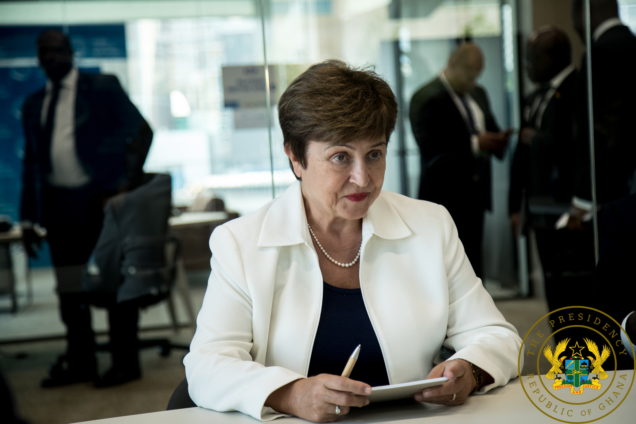International Monetary Fund (IMF) chief Kristalina Georgieva said she told China’s new top economic official, Li Qiang, they must accelerate work to reach debt restructuring agreements for countries like Zambia, Ghana and Ethiopia.
Georgieva, who met with Li and other top Chinese officials during a visit to China last month, said on Thursday she found Li very approachable and pragmatic.
She said he assured her that he wants China to play a constructive role in resolving debt relief cases.
“The truth is, and I was ... very straightforward on that, it takes far too long for that (debt) resolution,” she told an event hosted by Meridian House and Politico.
“Yes, China has multiple institutions that deal with that, that makes it complicated domestically, but they have to speed up their participation.”
The United States and other Western countries have faulted China for causing delays in setting up restructuring agreements for heavily indebted countries that have asked for help under the Common Framework set up by the Group of 20 major economies.
Georgieva noted China had been helpful in reaching a debt relief deal for Chad, and also Sri Lanka, a middle-income country that was not eligible for help under the G20 framework, and she encouraged China to show progress on other cases.
About 60% of low-income countries are already in or at risk of debt distress, and about 25% of emerging economies are at high risk and facing “default-like” borrowing spreads, Georgieva said.
Georgieva said that during her visit Chinese officials underscored their commitment to multilateralism, opening up China’s economy for more trade, and debt restructuring.
The IMF this week said rising geopolitical tensions and the resulting fragmentation of the global economy could increase financial stability risks, reducing cross-border investments, asset prices, payment systems and banks’ ability to lend.
The global lender has long warned of increased costs, economic friction and GDP output losses associated with the global economy’s fragmenting into geopolitical blocs, with U.S.-led democracies on one side and China and other autocratic states on another. Those concerns have been heightened since Russia’s invasion of Ukraine.
Georgieva said Chinese officials also worried about fragmentation, but their foremost concern was securing jobs at home, with a target of creating 12 million jobs this year.
Latest Stories
-
WAFU B U-17 Girls Cup: Black Maidens duo pick up top awards in inaugral edition
5 minutes -
International Day for PWDs: Telecel Ghana Foundation trains deaf students in robotics
5 minutes -
Kasia Coal releases holiday anthem ‘Feliz Navidad’
27 minutes -
American Airlines grounds all US flights on busy Christmas Eve
33 minutes -
UNICEF urges Ghana to prioritise TVET investment to address youth unemployment
35 minutes -
Businessman to plead guilty in NY Mayor Adams’ corruption case
40 minutes -
Black Sherif stamps authority with aura as high as his shoulder pads at ‘Zaama Disco’ concert
42 minutes -
Let go AFCON qualification woes and back Black Stars in World Cup qualifiers – Joseph Paintsil
45 minutes -
The US town where it’s the law to own a gun
55 minutes -
We must maintain the credibility of our electoral system – Dr. Bossman Asare
2 hours -
World Cup 2026: Support us in upcoming qualifiers – Ghana forward Joseph Paintsil to fans
2 hours -
WAEC to release 2024 WASSCE results by December 29 – Education Minister
3 hours -
Policy rate to fall to 22.5% in 2025 – Deloitte
3 hours -
Omane Boamah blasts ‘criminal and biased’ EC for justifying re-collation decision
3 hours -
UPSA alumnus files injunction against investiture of incoming VC
3 hours

